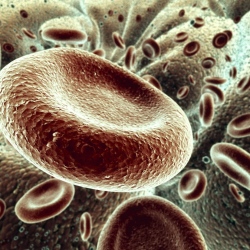
A recent study showed that giving hemophilia patients blood clotting genes can partially make up for their deficiencies and reduce bleeding. Hemophilia B is a heredity disorder caused by a defective gene for the blood clotting protein called factor IX. Researchers in Britain successfully treated six people with hemophilia by giving them a gene with a functional form of factor IX. Previous clinical trials have attempted to treat hemophilia with gene therapy, but expression of the vital factor had been short-lived. In the current study the researchers used a modified viral vector – the carrier DNA into which the factor IX DNA is inserted – that targeted the DNA specifically to the liver where factor IX is normally produced. Other studies had shown that the vector could be expressed in the livers of large animals for at least 10 years. The strategy worked, at least a year out after treatment. The participants in the study all had severe hemophilia B, meaning their bodies produced less than one percent normal factor IX levels. In a dose-dependent manner the gene raised factor IX levels in the participants between 2 and 12 percent. Not spectacular increases, but effective nonetheless. Severe hemophiliacs have to receive injections of the factor IX protein two to three times a week to avoid severe bleeding. Four of the participants were able to stop treatment injections altogether and the other two were able to extend time between injections.
